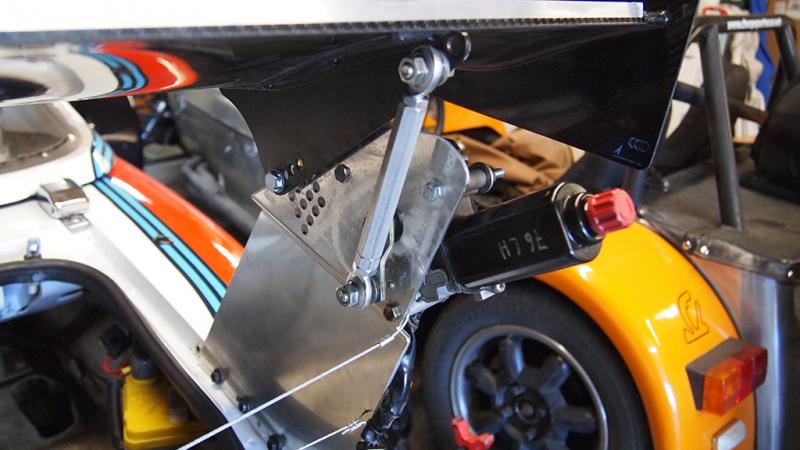So, I found myself at loose ends and decided to have a little fun.
I've been reading a lot of Can-Am books and followed a McLaren MP4-12C around the track a few months ago - so I had to try this. Not legal in almost every race class, although it is legit in Targa Newfoundland Open class. Really, it's just fun to play with.
McLaren!
http://www.youtube.com/watch?v=qRrUgo_FyWQ&feature=player_embedded#t=34
The initial plan was to use a SPAL linear actuator with a cool three-position controller. I'd have a low drag setting (triggered by a momentary button on the steering wheel), normal (the default) and high drag (triggered by the brake lights). Unfortunately, the speed of the SPAL part was just too slow, 1/2" per second. I could speed that up with linkages, but it was less than ideal. I've since found that there's a different version of the same actuator that runs about four times faster, so I may investigate that in the future.
Warren V had been playing with headlight motors and thought they'd make good actuators for an active wing. They're strong, fast, repeatable and cheap. They also have internal logic that's easy to control. 12V on one wire makes them go up, 12V on another makes them go down. The motors spin at 50 rpm, and with the standard levers that means about 6.5" per second of stroke. You can change this by changing the length of the levers.
The goal here was to build a proof of concept without cutting up the car. I took an extra set of mounts and attached the motors to the sides in a convenient place, then triggered them with a SPDT relay attached to the brake lights. There's an override switch in the cockpit that turns off the active wing. The wing takes 0.6 seconds to change position, although it's effectively faster on retraction because of the way I have the various linkages clocked.

First test around the neighborhood. http://www.youtube.com/watch?v=7VHDfn_rHAk
First test at the track. Max velocity was about 123 mph here, the whole thing seems to be holding up nicely.
http://www.youtube.com/watch?v=gK5wDfDK2Lk
It's ridiculously fun watching the wing flip around back there. The car just feels solid and stable, as if the brakes are more powerful. They seem less prone to lockup as well, although it's possible that I'm not braking as hard and relying on the aero to scrub off speed instead.
Just thought you'd find this entertaining like I did.












































